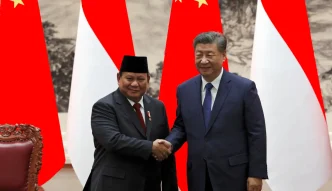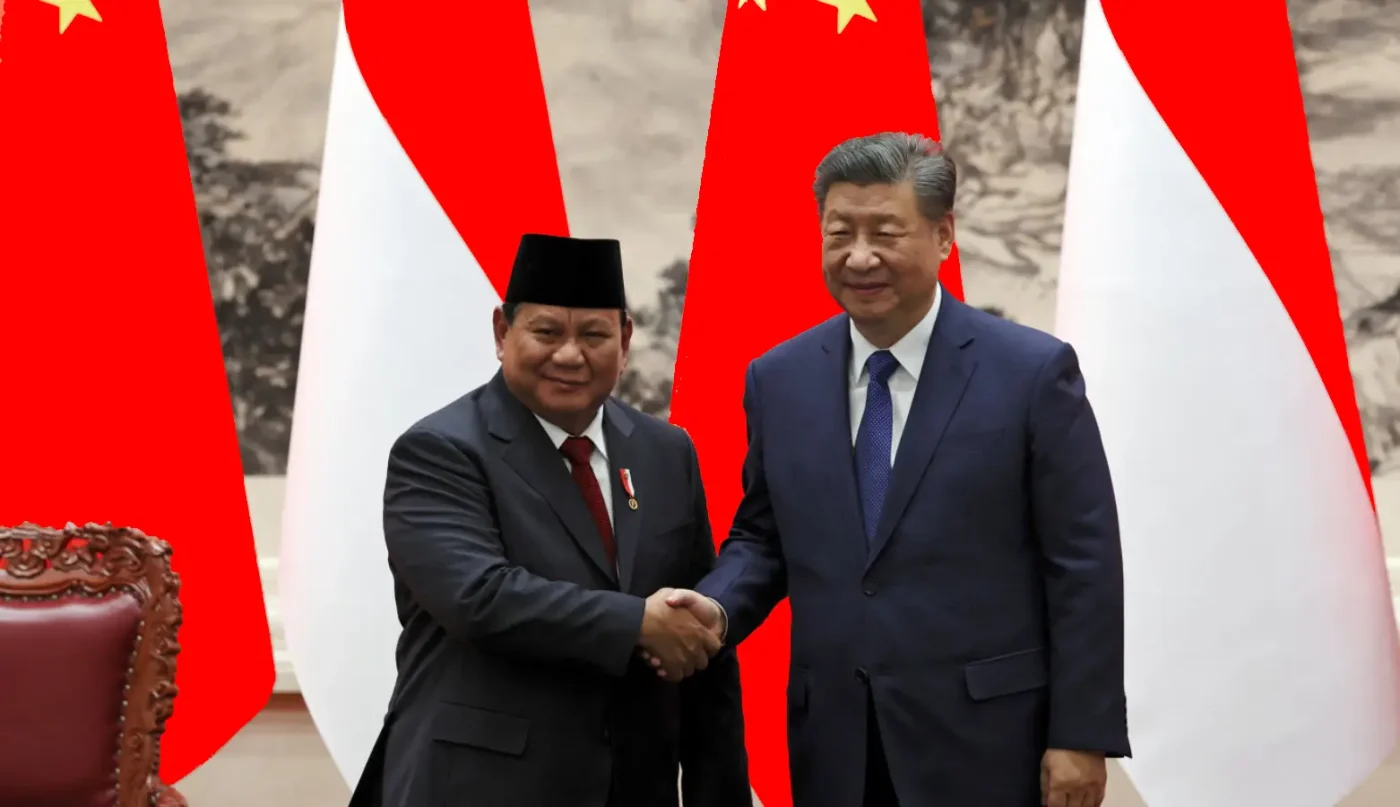In a display of strengthening bilateral ties, Indonesian President Prabowo Subianto welcomed Chinese Premier Li Qiang to the Presidential Palace in Jakarta on May 25, 2025, marking a significant moment in the economic and diplomatic relationship between the two nations. The visit, coinciding with the 75th anniversary of diplomatic relations, comes at a time of heightened global economic uncertainty, with the United States under President Donald Trump imposing sweeping tariff wars on multiple countries, including Indonesia and China. Against this backdrop, the two Asian powerhouses appear determined to bolster their economic partnership, raising questions about Indonesia’s long-standing commitment to non-alignment.
A Strategic Partnership in Focus
The high-profile visit by Premier Li, accompanied by a substantial business delegation, underscored the deepening economic cooperation between Jakarta and Beijing. During the Indonesia-China Business Reception, President Prabowo and Premier Li oversaw the signing of several key agreements, including the implementation of investment deals worth over US$10 billion, initially agreed upon during Prabowo’s visit to Beijing in November 2024. Additionally, a significant pact between the chambers of commerce of both nations was finalized, aimed at fostering closer business-to-business ties, whether among private enterprises or state-owned entities.
The agreements build on the Strategic Comprehensive Partnership signed in 2013, which both leaders emphasized as a cornerstone of their relationship. With trade and investment already forming a critical pillar of Indonesia-China ties, the latest deals signal an intent to further integrate their economies. China, the world’s second-largest economy, and Indonesia, Southeast Asia’s largest, have found common ground in reducing reliance on Western markets, particularly as US tariffs threaten to disrupt global trade flows.
Geopolitical Implications of Closer Ties
The timing of Li’s visit is no coincidence. With the US adopting an increasingly protectionist stance under the Trump administration, countries like Indonesia and China are exploring ways to insulate their economies from external shocks. For Indonesia, deepening ties with China offers a buffer against potential trade disruptions, given Beijing’s role as a major trading partner and source of investment. However, this shift has sparked debate among analysts and policymakers in Jakarta about the risks of over-reliance on a single partner, particularly one with significant geopolitical baggage.
Indonesia has long prided itself on a non-aligned foreign policy, a principle rooted in the Cold War era and enshrined in the Bandung Conference of 1955. Yet, the current global landscape—marked by intensifying US-China rivalry—has placed pressure on Jakarta to navigate a delicate balancing act. While the government insists it remains committed to neutrality, the optics of high-level engagements with Beijing, coupled with substantial economic agreements, may fuel perceptions of a tilt toward China. If sustained, this could complicate relations with other key partners, including the US, Japan, and Australia.
Economic Benefits and Domestic Concerns
The economic benefits of closer ties with China are undeniable. Chinese investments have fueled infrastructure development across Indonesia, from high-speed rail projects to industrial parks, while trade between the two nations continues to grow. The agreements signed during Li’s visit are expected to further stimulate sectors such as manufacturing, energy, and technology, creating jobs and boosting economic growth in a country of over 270 million people.
However, the deepening relationship is not without its detractors. Within Indonesia, concerns persist about the country’s growing dependence on Chinese trade, investment, and financial assistance. Critics argue that this reliance could undermine national sovereignty, particularly as Chinese goods flood local markets, often outcompeting domestic producers. Additionally, the presence of Chinese workers in various projects has sparked tensions, with some Indonesians questioning the benefits of such initiatives for local communities.
Another point of contention lies in the South China Sea, where overlapping territorial claims have led to occasional skirmishes between Indonesian and Chinese vessels. While both leaders avoided public discussion of the issue during the visit, it remains a thorn in bilateral relations, with Indonesian military officials and politicians expressing wariness about Beijing’s intentions in the region. Historical suspicions also linger, dating back to allegations of Chinese Communist Party interference in Indonesian politics during the 1960s, which led to a 25-year freeze in diplomatic ties until 1990.
Balancing Act: Diversifying Partnerships
Amid the fanfare of Li’s visit, observers have cautioned against Indonesia placing all its economic eggs in one basket. While reducing dependence on the US market may be a strategic move, analysts suggest that Jakarta must simultaneously strengthen ties with other regional players, including Japan, South Korea, India, and fellow ASEAN member states. Such diversification could mitigate the risks associated with over-reliance on China, ensuring that Indonesia retains leverage in its foreign and economic policies.
Japan, for instance, has long been a trusted partner, with significant investments in Indonesia’s automotive and infrastructure sectors. South Korea, meanwhile, offers expertise in technology and innovation, while Australia provides opportunities for collaboration in agriculture and mining. By fostering deeper economic cooperation with these nations, Indonesia could strike a healthier balance, avoiding the pitfalls of dependency while still capitalizing on China’s economic might.
Public Sentiment and Political Ramifications
Public opinion on Indonesia’s relationship with China remains divided. While many Indonesians welcome the economic opportunities brought by Chinese investment, others harbor reservations about Beijing’s broader intentions. Social media platforms, including posts on X, reflect this ambivalence, with some users praising the potential for job creation and infrastructure development, while others express concern about cultural and economic dominance by a foreign power. These sentiments are particularly pronounced among younger Indonesians, who are increasingly vocal about issues of national identity and sovereignty.
Politically, President Prabowo faces the challenge of addressing these concerns while maintaining the momentum of economic cooperation. His administration must demonstrate that closer ties with China do not come at the expense of Indonesia’s autonomy or regional relationships. Transparency in agreements, coupled with efforts to ensure tangible benefits for local communities, will be crucial in assuaging domestic skepticism.
Looking Ahead: A Reciprocal Visit on the Horizon
The visit by Premier Li has set the stage for further high-level exchanges, with anticipation building for a potential trip by Chinese President Xi Jinping to Jakarta. Such a visit would reciprocate Prabowo’s November 2024 trip to Beijing and serve as a symbolic affirmation of the importance both nations place on their partnership. It could also provide an opportunity to address unresolved issues, including those related to the South China Sea, in a more candid manner.
For now, the trajectory of Indonesia-China relations appears firmly rooted in economic cooperation, with both sides keen to build confidence and trust. Yet, as global geopolitical tensions continue to simmer, Jakarta’s ability to maintain its non-aligned stance will be tested. The coming months will reveal whether this partnership can evolve into a truly balanced and mutually beneficial relationship, or if it risks tilting Indonesia too far into Beijing’s orbit.
As the dust settles on Li Qiang’s visit, one question looms large: can Indonesia harness the benefits of closer ties with China while safeguarding its independence in an increasingly polarized world?
















